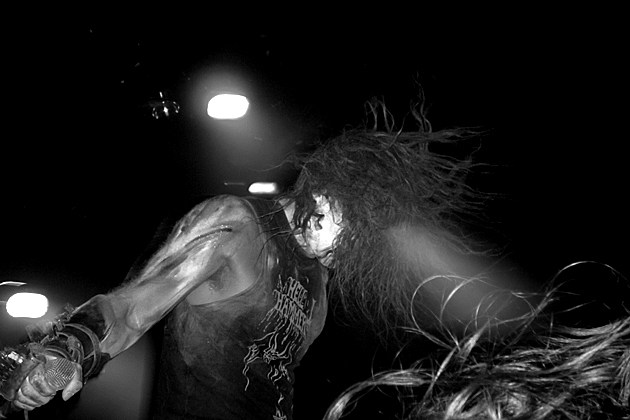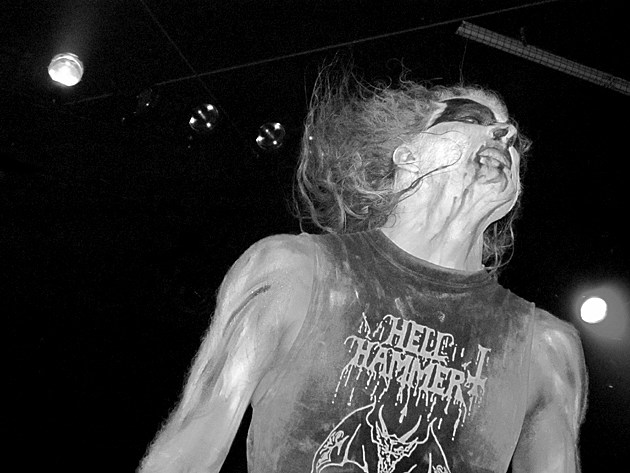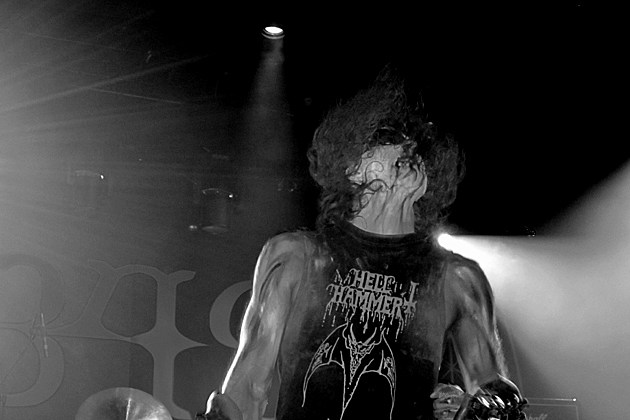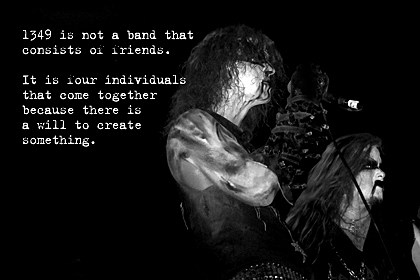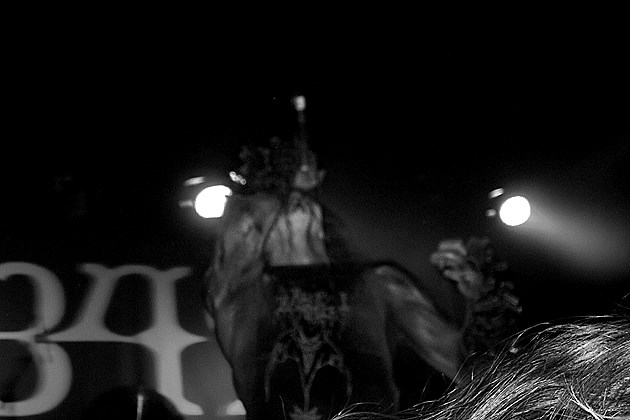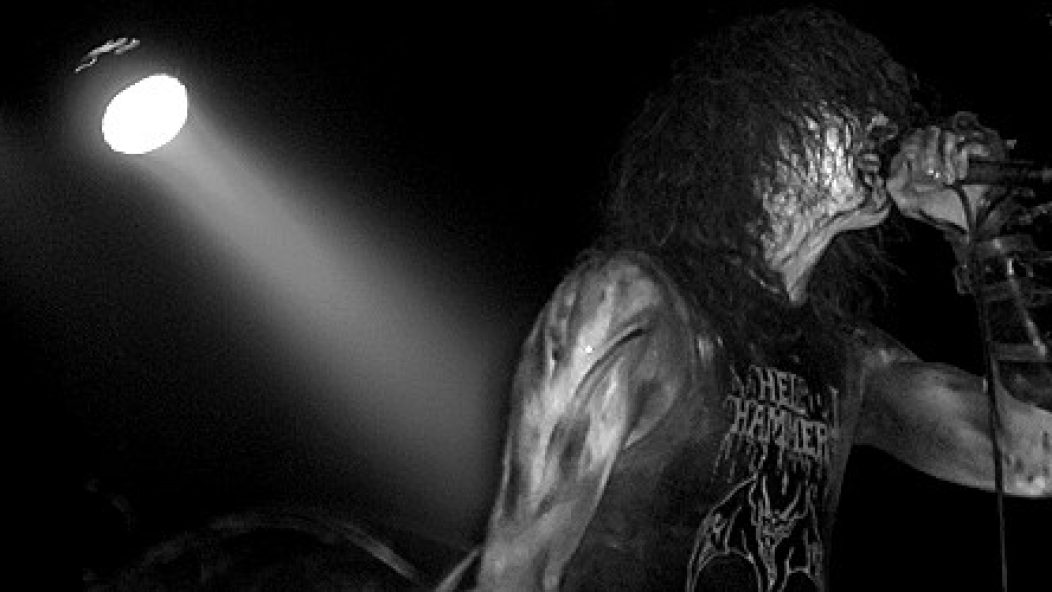
Interview: 1349
It’s strange how some things can seem obvious, yet be hidden. 1349 is one of the big names of Norwegian black metal, but I’ve found little press on the band beyond Wikipedia-level interviews. Maybe people aren’t asking the right questions. I tried to ask some of them to vocalist Ravn on 1349’s recent tour with Triptykon. Despite his tentative English, his views came through strongly and clearly. Afterwards, I saw 1349 in a different light. You may, too.
. . .
What is the goal of 1349?
The goal is to maintain the black metal aura that was founded in the early ’90s by bands like Burzum, Thorns, Mayhem, and Darkthrone, and build it from there, and make our own attempt to uphold the values and bring the genre forward in a direction that we think is the right way to go.
You’ve said that you started 1349 as a reaction to where black metal was headed in the mid-’90s. What was wrong with black metal then?
People got too carried away by the attention by major labels and the more commercialized aspect of it, bringing in a lot of synthesizer themes and making it all sound completely wrong. It took a lot of the soul out of it. It lost the edge and the creativity that was there. It just started to be basically heavy metal with corpsepaint, and that kind of defeated the purpose of the genre. So that’s why I chose to do something about it instead of just complain about it like the rest of the world.
So do you see black metal as something apart from heavy metal?
Yeah, definitely. Black metal is even more complex than that sentence. I see it as an artform, a platform where we can combine the visual aspect with the audio aspect. It holds no rules [about] how to make the music. It’s based on the feeling in the music and the emotions that the music makes you feel. Hence it’s a very personal artform. That’s what I like about it. That’s what makes it different from other metal genres.
If black metal is very personal music, what feelings and emotions does it bring out in you?
It brings out what I like to refer to as very primal feelings that lie hidden in any man, and have been suppressed by religion for many, many years now. [These are] very raw and brutal emotions that live in human beings and are a part of our animal nature. These are not accepted by Christian and other religious-based societies. They are seen as evil and are therefore to be suppressed.
You see a lot of outbursts into insanity or extreme, violent aggressions. It’s because people don’t know how to confront or control their basic instinct. It still lies in human beings, being the fact that we are animals. But, of course, [religions] also deny the fact that we are animals. [They hold that] we are created by a god, so I guess it all comes down to a collision course, anyway.
. . .
. . .
You can see the connection between the human and the animal in the first three 1349 records. The songs are very relentless and physical. Then with Revelations of the Black Flame, you started using the studio as an instrument. What inspired that change?
The first three albums came in a pretty rapid course. We were determined to set a standard right, where we wanted to bring this extreme brutality back into the music. The genre had been occupied by melodic synthesizers. That’s why Liberation is called Liberation. It’s a liberating album from that era.
We decided that we wanted to be a touring band, a live act. This happened after Hellfire. So we spent almost two and a half years on the road. We got a lot of feedback from fans, and the media [attention] was really picking up. There was a lot of input coming to us. What we noticed was that all the people following our music loved the fast and furious aggression.
We see our music [as being] a little bit more complex than that. There are a whole lot of atmospherics that we realized had been lost, either [in] the production or the way that people didn’t get it. With Revelations, we wanted to focus fully on the atmosphere that is in the music and purify that. We stripped away all the obvious furious things, and we focused on making it furious on a completely different level in order to show the hidden sides of 1349’s music. We felt that that needed to be done in order to push forward.
Did other artists or albums inspire the more atmospheric direction?
Not really. People have pointed out references in retrospect, but I didn’t bring anything into the studio [as a reference point]. It was a more a work-in-progress. Things happened in the studio. It was an extremely, extremely creative process. It was almost fiery at times. The whole mood in the studio was extremely special, more special than it’s been on other recordings. It was a highly potent and short outburst of creativity that is captured on the album.
Were you shocked by fans’ reactions to Revelations?
No. That was completely expected. We cannot take into consideration what fans will think or do. If we stop making music for ourselves and the music we want to make, or [if we] adapted to our fans, that would be a betrayal to our fans, because then 1349 would not be 1349. It would be 1349 trying to make music for the fans.
My experience is that the best albums – it’s hard grasping them at first, but if you spend some time listening to them, they will grow on you. And those will be the albums that stick with you for the rest of your life. [Revelations] was a risk that we needed to take.
Did you learn any lessons from Revelations going into Demonoir?
In many ways, Demonoir is a prolonging of Revelations, due to the atmospheric parts. Demonoir is a much more atmospheric album in total than, for example, Hellfire. We always tend to look back at our previous albums and see what we want to bring with us in order to move forward, and what we can do to progress as both musicians and individuals.
. . .
. . .
Now that 1349 is over a decade old, and the band’s sound has changed, has your conception of 1349 changed?
The band is actually 13 years [old] this year. The concept is still the same. It’s the same force that drives us all. The same magic is still happening. When we get together and start playing, the atmosphere is still the same. It is very, very hard to describe what’s happening.
1349 is not a band that consists of friends. It is four individuals that come together because there is a will to create something, and there is a magic happening in between us when we come together. That is the hidden force behind 1349. That is probably something that is different from many other bands that start up. 1349 was never started as a friends’ band. It was handpicked people to be there because of the energy that started flowing between the individuals.
How did you get into metal?
In the ’70s, I got to know bands like Deep Purple, Black Sabbath, Jimi Hendrix, and all kinds of hard rock bands. I liked the approach to music, but I always tended to like the more extreme stuff. I was always looking for bands that had more edge to them and were more furious, something that could put down the fury in my heart. I found the right band the first time I heard Slayer. It was like, “Yes, these guys have finally got it together. This is something that resembles the music that I want to make, the music that I want to hear”.
I went on [to] extreme bands throughout the ’80s, like Bathory and Celtic Frost, of course, and to a smaller extent, Venom and [the first wave of black metal]. It wasn’t until I heard Burzum for the first time that I found the exact arena for the musical perfection I was seeking. It’s been only one way since that.
Of course, I listen to a lot of different styles and kinds of music. I like to use music to put me in a mood or to get out of a mood. It’s all about the feeling in the music. Almost all of the music that I have, it holds a little bit of a darker nature in that it is more true to ordinary life lyrically, or the music holds a more aggressive or depressive way.
Ravn on “The Raven”
[audio: 1349_RAVN.mp3]
How did you choose the name Ravn, and what does the character Ravn mean to you?
The raven for me is a person that is distant and observing. It [reflects] my personal being. The black metal person in me is a purification of the inner self, in a way.
Are you Ravn in everyday life, or do you undergo a transformation on stage?
Well, both. [Ravn and my everyday self] both live in the same body. The alter ego, as you can put it, is a purification of one on my sides as a human being. It is probably the biggest side of me, actually.
What do you think about the state of black metal today?
To be honest, I actually don’t pay much attention. First and foremost, 1349 takes up quite a lot of my attention when it comes to music. That, combined with the rest of my day, [means] there aren’t too many hours left. [I don’t want to] spend that [time] on seeing what other people are doing to their black metal music. I would rather focus all my force into my own project. Of course, I come across new bands and what other bands have been doing as well. I listen to what they are doing and make up my mind then. But I don’t follow the scene as a fan would do.
. . .
. . .
What are you reading right now?
I don’t read much at all. I’m not a book person in general. My day schedule doesn’t allow [for] much activities such as book reading. I tend to [read] newspapers, articles on the Internet, documentaries on TV. That’s my main basis [for reading]. I hope to read the Hellhammer book. It’s the only plan I have for books at the moment.
You seem to have a well-shaped philosophy on life. If it didn’t come from books, where did it come from?
I play around a lot with philosophies in my head. I do a lot of thinking. I have been doing that my whole life. Most of the thoughts, I’m pretty sure, have been thought before. I don’t see myself as unique in any way. The thoughts have been thought before [by] different persons in different times.
That’s all the questions I have for you. Thank you for taking the time to do this interview.
OK, thank you so much. Thank you for taking the time as well.
I enjoyed Demonoir. I think it is a very interesting album.
Thank you so much. We can agree upon that (laughs).
I think that it took what you discovered on Revelations and sharpened it, especially with regards to timing.
It’s about bringing with you the knowledge that you come across, and purifying it in order to grow in every way, as musicians and human beings. That’s what life is about. It’s not about going around waiting to die, because then you’re going to live forever, like would be the religious way to see it. I am not a religious person, so I have to make a different stand in my life.
. . .
STREAM DEMONOIR IN ITS ENTIRETY HERE
. . .
. . .
